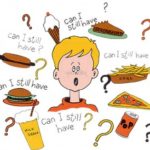
IBS – But What CAN I Eat?
 Suffering from abdominal pain, cramps, bloating, and gas? You’ve likely been told it could be IBS. Irritable bowel syndrome is the diagnosis often given to people who suffer from uncomfortable symptoms regarding the gut and bowels, and is distinct from Irritable Bowel Disease as the cause of irritation is unknown. IBS as you can imagine is extremely uncomfortable for those who suffer from it. Symptoms can be chronic or sporadic but are typically triggered by certain foods or during periods of stress. Some individuals are more prone to constipation while others may experience diarrhea. Whether you are chronically dealing with gut pain or have anxiety about being out in public during a flare up, IBS can be very crippling for many of its sufferers.
Suffering from abdominal pain, cramps, bloating, and gas? You’ve likely been told it could be IBS. Irritable bowel syndrome is the diagnosis often given to people who suffer from uncomfortable symptoms regarding the gut and bowels, and is distinct from Irritable Bowel Disease as the cause of irritation is unknown. IBS as you can imagine is extremely uncomfortable for those who suffer from it. Symptoms can be chronic or sporadic but are typically triggered by certain foods or during periods of stress. Some individuals are more prone to constipation while others may experience diarrhea. Whether you are chronically dealing with gut pain or have anxiety about being out in public during a flare up, IBS can be very crippling for many of its sufferers.
Since the cause of irritation is unknown and is likely different for everyone, the remedies to help provide some relief will be different too. The only sure way to know what may help you is through trial and error. Food is meant to be therapeutic and nourishing but for IBS sufferers it can be a nightmare trying to figure out what you can tolerate and what brings you agony. Right now there are three diets recognized to help with IBS: SCD, FODMAP or GAPS.
Specific Carbohydrate Diet (SCD) is a whole foods diet that avoids processed foods, sugars, starches and grains. The belief here is that complex carbohydrates are slow to digest and the pathogens bad little critters in our gut feed off of them. Only monosaccharides (simple sugars) are permitted on this diet as they are easier on the digestive tract. When food is properly digested and absorbed, there is nothing left in the gut for the bad little critters to feed on.
FODMAPs stands for Fermentable Oligosaccharides Disaccharides Monosaccharides and Polyols and aims to starve the bad bacteria by limiting foods that are poorly absorbed in the small intestine. FODMAPS has been further researched since SCD was introduced and therefore limits more foods (including monosaccharides) that are now known to be troublesome for an irritated gut. Foods are rated as low, medium or high FODMAP and the goal is to limit as much as possible high FODMAP foods because when eaten in excess these foods feed pathogens in the gut.
Gut And Psychology Syndrome (GAPS) is more restrictive than the previously mentioned diets, especially in the introductory phase. GAPS has more of a therapeutic approach to heal the gut versus just eliminating foods that are causing damage. The introductory phase, which lasts three to six weeks, consists entirely of homemade meat stock and vegetables with added probiotic rich foods such as sauerkraut – so hopefully you love soup!
Tired of suffering with your IBS? A holistic nutritionist can provide guidance on how to successfully eliminate trigger foods and incorporate foods and supplements that will help repair and nourish your gut. No more gut pain = a healthier and happier you
Yaletown Naturopathic Clinic. Email: info@yaletownnaturopathic.com






Leave a Reply
You must be logged in to post a comment.